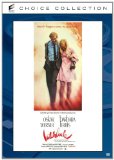| Reviews & Columns |
|
Reviews DVD TV on DVD Blu-ray 4K UHD International DVDs In Theaters Reviews by Studio Video Games Features Collector Series DVDs Easter Egg Database Interviews DVD Talk Radio Feature Articles Columns Anime Talk DVD Savant Horror DVDs The M.O.D. Squad Art House HD Talk Silent DVD
|
DVD Talk Forum |
|
|
| Resources |
|
DVD Price Search Customer Service #'s RCE Info Links |
|
Columns
|
|
|
Interlude (1968)
Pretty-looking slush. Columbia/Sony's own M.O.D. (manufactured on demand) service of hard-to-find library and cult titles (which used to be called Columbia Classics but which now appears to be Sony Pictures Choice Collection), has released Interlude, the 1968 remake of a remake from Columbia Pictures featuring Oskar Werner, Barbara Ferris, and Virginia Maskell caught up in an impossible love triangle. A solid supporting cast (including Donald Sutherland during his early "English" phase), some gorgeous shots of late-60s London and England, and a whole lot of beautiful classical music on the soundtrack...doesn't add up to a whole hell of a lot, but fans of romantic tearjerkers will gently weep their approval. No extras for this good-looking transfer.
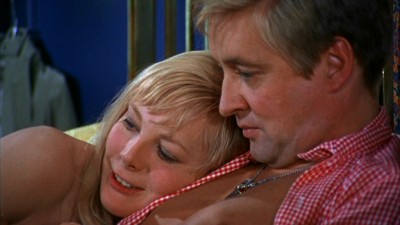
Full-of-himself superstar classical music conductor Stefan Zelter (Oskar Werner) lives in a palatial mansion in the English countryside outside London with his posh, glacial merchant banker wife, Antonia (Virginia Maskell), and their two adorable little children―a decorative family for such a famous artistic figure, and one carefully arranged and compartmentalized in the busy conductor's life. Fleet Street stringer/journalist Sally (Barbara Ferris) is given Zelter as an assignment: apparently, Stefan, over artistic differences, has walked out of an important European concert contract, and is now laying low in London on the advice of his attorney, Humphrey Turnbull (Robert Lang). This somehow being important news, Sally goes to interview the brusque, journalist-hating Stefan, an interview orchestrated by silly twit John Cleese, and before you can say, "Is that your baton or are you just glad to see me?" Stefan is bewitched by the seemingly mousey Sally, and together, they embark on a angst-ridden "interlude."
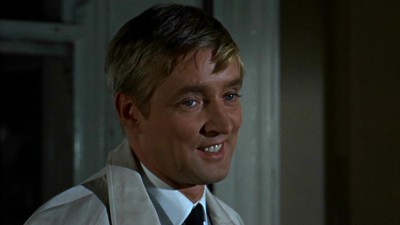
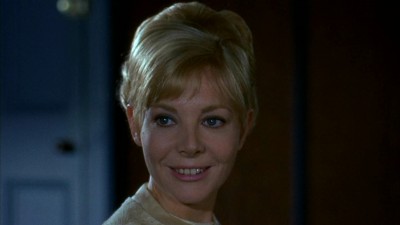
Schmaltz to the nth degree, leavened somewhat by some good acting here and there, Interlude is only going to work for viewers who already enjoy this kind of hearts-and-flowers exercise...and I would certainly include myself in that group. As I've written many times before, I love romantic melodrama (although admittedly, the coarser, the better), and even though Interlude is a tad too genteel and syrupy for my first preference, it still works out in the end because its tried-and-true formula is adhered to rigidly. You already know what's going to happen with the characters in Interlude before the first scene is over...and that's not just because the movie begins at the end of their story, telling Stefan's and Sally's love affair in flashback. You know what's going to happen to them because what happens to Stefan and Sally always happens to doomed lovers in these kinds of impossible romantic triangles. So don't expect ground-breaking dramaturgy here, even though Interlude tries to be "hip" in terms of cinematic approach (in 1968 context, of course), from long montages (that unintentionally remind you of those FDS Deodorant Spray® commercials where someone is running through the woods), to artful-but-now-obvious jump cuts.
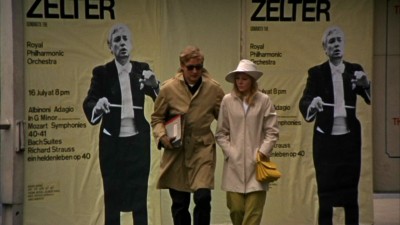
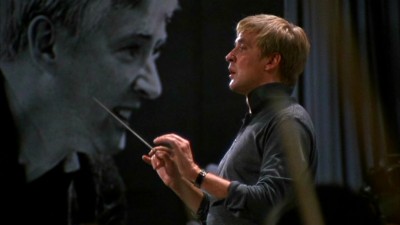
Interlude's script by Lee Langley and Hugh Leonard (everything from Great Catherine to the infamous sex comedy Percy) switches around a few details from the first two versions of this James M. Cain story (John M. Stahl's 1939 When Tomorrow Comes and Douglas Sirk's 1957 Interlude), with the most noticeable difference being the conductor's wife is now no longer "mad," but quite normal (if a bi standoffish). Perhaps the makers of this Interlude felt such a character would come off as too manipulative and too, too melodramatic for the swinging scene of London in 1968, but that loss does make it harder for director Kevin Billington (The Rise and Rise of Michael Rimmer, The Light at the Edge of the World) to come up with a valid reason for Werner to be sniffing after Ferris. Instead, Billington and his scripters turn the focus on Werner as a self-centered womanizer who admits to previous escapades but who is serious about this one. With lovely Maskell (who tragically would commit suicide shortly after this movie wrapped production) shown as basically faultless in this romantic triangle, Werner and Ferris then get to suffer prettily for us in their guilt―a tactic that might have had more pull had the screenwriters and director provided the viewer with a solid-enough understanding of why Werner and Ferris become attracted to each other in the first place. Those early scenes of "seduction" are pretty to look at, but they're almost meaningless in terms of exposition because Ferris doesn't really do anything out-of-the-ordinary to attract Werner: he just calls her up and they're an item (and conversely, we never get a handle on why she's suddenly attracted to him). If the purpose of all this shadowplay is 1968 arty vagueness, it succeeds...but it also opens up Interlude to charges of shallowness (shallowness that in and of itself isn't disagreeable, as long as the classical music booms and the frames are pretty).
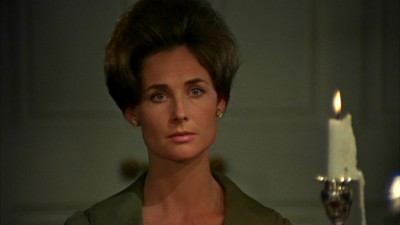
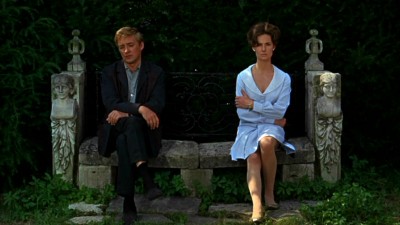
I can't say I found Ferris particularly mesmerizing here. Her elfin looks and her incongruously throaty voice are as mismatched as her ability to seem completely unconvincing in her most important, crucial "big emotional" scenes (I'm sorry, but Romantic Melodrama 101 demands that the heroine be able to cry convincingly; when Ferris attempts it, she looks like she's just sat on a porcupine). Indeed, lithe, perfectly sculpted Maskell is far more intriguing here (she deservedly won some awards for her turn here), her whispery delivery and beautiful lynx-like eyes conveying much more than what appears on her script pages. Shouldn't Werner still be obsessed with her, rather than inexplicable Ferris (this miscasting reminded me of another variation of the doomed triangle, the goofy Fatal Attraction, where viewers wondered who in their right mind would cheat on sexy Anne Archer with unfortunate Glenn Close)? As for Werner, he was coming to the end of his string here as far as movie companies pushing his sex appeal-for-intellectuals. American women who actually showed up for Stanley Kramer's Ship of Fools fell madly in love with Werner's expert creation of the doomed, romantic ship's doctor who dies literally of a broken heart. In Interlude, however, he's fighting against his character's background as a casual adulterer who's more obsessed with music than his nice family. Werner tries hard to give his character some depth, mostly in his quiet moments where he's contemplating the ever-growing mess he's creating in his personal life, but we never learn enough about why Ferris in particular makes him break from his too-orderly life, and no amount of stagecraft is going to cover up that thinness.
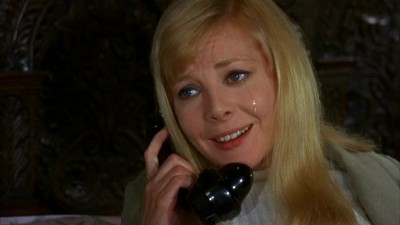

Still...if a Hallmark® card sticks to its business of distilling down complicated emotions into a readily-digestible poem, it succeeds, and Interlude is no different. It may not work as even middle-of-the-road drama―since that road is awash in syrup―but it does deliver the elements of the formula that fans of the genre demand: the mooning glances, the tortured recriminations, the stillness of guilty lovers wanting to stretch every available, stolen moment (...until the guy has to hop-to-it back to the wife), all to the accompaniment of composer Georges Delerue's aching score (bolstered by the likes of Mozart and Beethoven). In the end, that's enough for Interlude.
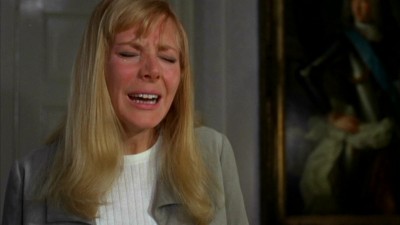
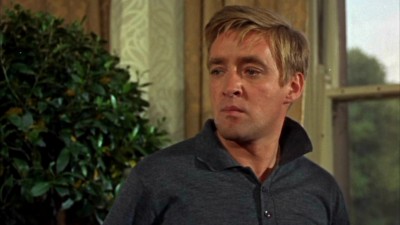
The DVD:
The Video:
The anamorphically-enhanced 1.85:1 widescreen transfer for Interlude looked a tad dark to me, with a bit of expected grain and colors that were rich if occasionally muddy at times. Sharp image, though. No compression issues.
The Audio:
The Dolby Digital English split mono is loud enough...but it's a shame we can't hear that music in 5.1. No subtitles or closed-captions.
The Extras:
No extras for Interlude, not even a menu (it just loops continuously when the disc is put in).
Final Thoughts:
Gorgeous junk that works in the end because it delivers the expected conventions of the genre. Oscar Werner at least tries to deliver an added dimension to his compromised character, but Barbara Ferris fails to impress...although to be fair, a lot of that is the thin script's fault. Only beautiful Virginia Maskell seems in tune with the movie's vague, gauzy, doomed romanticism. Gorgeous cinematography and even better music help mightily here. I'm recommending Interlude.
Paul Mavis is an internationally published film and television historian, a member of the Online Film Critics Society, and the author of The Espionage Filmography.


|
| Popular Reviews |
| Sponsored Links |
|
|
| Sponsored Links |
|
|
| Release List | Reviews | Shop | Newsletter | Forum | DVD Giveaways | Blu-Ray | Advertise |
|
Copyright 2024 DVDTalk.com All Rights Reserved. Legal Info, Privacy Policy, Terms of Use,
Manage Preferences,
Your Privacy Choices | |||||||









